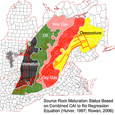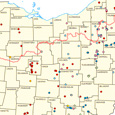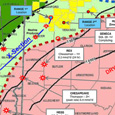Opinions vary in Pennsylvania’s Act 13 ruling
Monday, September 29, 2014

In December 2013, the Pennsylvania Supreme Court turned down Act 13, a state law that would require townships to permit shale drilling in all zoning areas.
In the Declaration of Rights in the Pennsylvania Constitution, Article 1, section 27, also known as the “environmental rights amendment,” states that “the people have a right to clean air, pure water, and to the preservation of the natural, scenic, historic and esthetic values of the environment. Pennsylvania’s public natural resources are the common property of all the people, including generations yet to come. As trustee of these resources, the Commonwealth shall conserve and maintain them for the benefit of all the people.”
The case was a four-justice majority opinion, based on the grounds that the key provisions were unconstitutional.
Panel discussion
The Shale Insight conference held in Pittsburgh, Pennsylvania Sept. 24 and 25 focused on oil and gas drilling topics, including a discussion on the Act 13 Pennsylvania Supreme Court Decision.
Varying opinions linger in the aftermath of the Court’s decision, specifically on the obligations of municipalities since Act 13 was struck down.
“How do you know when you’ve protected clean air and water?” David Overstreet, ALL Consulting partner, asked in regards to how townships are going to regulate local provisions.
David Ball, Peters Township councilman, is pleased with the Court’s decision, stating that drilling isn’t appropriate in certain places, such as residential areas.
“Industrial operations belong where industrial operations belong,” Ball said.
John Dernbach, Esq. of Widener Law, argues that the provision is unconstitutional and had nothing to do with Article 1, section 27’s rights to clean air and water.
“To minimize Article 1, section 27 issues, don’t give people anything to complain about,” Dernbach said.
Christopher Rimkus, Esq., attorney for MarkWest Energy Partners, L.P., claims that as a result of the ruling, people will lose mineral rights.
What does this mean for Pennsylvania’s fracking?
Some, like Dernbach, believe that not much will change with the Pennsylvania’s oil and gas drilling regulations after the Act 13 ruling. However, lawsuits have been filed and permits have been overturned, according to Rimkus. Rimkus also voiced that townships aren’t prepared to be the authority when it comes to drilling regulations.
Ball’s opinions differ from Rimkus’: “Township by township has to decide if it [drilling] is feasible and how it affects other people.”
Though the Court’s decision may be viewed as a game-changer, the effects of the Act 13 decision will be evident in the future.




